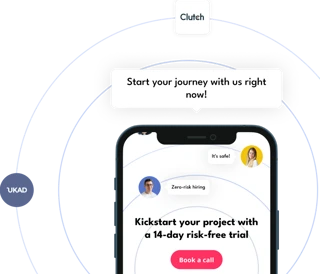In today's fast-paced digital world, traditional learning methods are rapidly evolving to meet the demands of modern learners. One such transformation is the rise of eLearning, which has revolutionized education and training across various industries. As the eLearning industry continues to expand, organizations are seeking custom eLearning development services to create engaging and interactive learning experiences. In this blog post, we will explore the benefits of eLearning solutions and how they are shaping the future of education and training.
Why Do We Need eLearning?
Despite it's not something unique today, the true reasons for investments into eLearning are numerous and somehow unobvious, so here is a list of reasons to take a look at this technology:
- Accessibility: eLearning platforms have made education and training accessible to people worldwide. They break down geographical barriers, enabling individuals to access high-quality educational resources regardless of their location. This accessibility is especially important for those in remote or underserved areas who may not have access to traditional educational institutions.
- Flexibility: eLearning offers unparalleled flexibility in terms of when and where learning can take place. Learners can access course materials and content at their convenience, allowing them to balance education with work, family, and other commitments. This flexibility is particularly valuable for working professionals and adult learners.
- Customization: eLearning platforms often allow for personalized learning experiences. Learners can choose courses and content that align with their specific interests and goals. Additionally, adaptive learning technology can tailor the learning experience to an individual's pace and learning style, optimizing retention and comprehension.
- Diverse Course Offerings: eLearning platforms offer a wide range of courses and subjects, from academic disciplines to vocational skills and hobbies. This diversity empowers individuals to explore their passions, acquire new skills, and stay updated in rapidly changing industries.
- Interactivity: Many eLearning materials incorporate interactive elements such as quizzes, simulations, and multimedia content. This interactivity enhances engagement and comprehension, making learning more enjoyable and effective.
- Cost-Effectiveness: eLearning often proves to be a cost-effective solution for both learners and educational institutions. It eliminates the need for physical classrooms, printed materials, and travel expenses. Organizations can also save on training costs by using eLearning for employee development.
- Real-time Feedback: eLearning platforms often provide instant feedback through assessments and quizzes. This allows learners to gauge their understanding of the material and make necessary adjustments to their study approach. Educators and organizations can also use data analytics to assess learner progress and improve course design.
- Lifelong Learning: In today's rapidly changing world, continuous learning is essential. eLearning platforms facilitate lifelong learning by offering opportunities for individuals to upskill, reskill, and stay updated in their fields. This is crucial for career advancement and adaptability in the job market.
- Global Collaboration: Many eLearning platforms incorporate features for collaboration, discussion, and networking. Learners can interact with peers and instructors from around the world, fostering a global perspective and expanding their professional networks.
- Environmental Impact: eLearning is often touted as a more environmentally friendly option compared to traditional classroom-based education. It reduces the need for paper and transportation, contributing to sustainability efforts.
With all these points, we see how important is eLearning for digital transformation of routines. As well, we see its impact on other aspects of life, such as Environment. Summarizing, eLearning is a good industry to invest and expect great outcomes. So, let's go further!
The Growing Importance of eLearning
The eLearning industry has experienced significant growth over the past decade. With advancements in technology and the widespread accessibility of the internet, eLearning has become a preferred choice for both individuals and organizations. eLearning solutions provide the flexibility to learn anytime, anywhere, and at the learner's own pace. This convenience has made eLearning a popular method for upskilling, professional development, and enhancing knowledge retention.
Top List of eLearning Projects
For a better understanding of this industry, it's necessary to take a look at the most popular platforms. This discovery may provide an insightful vision of eLearning as a business area. Thus, it may help you to understand how to bring The Idea to life.
Coursera offers a vast selection of online courses from top universities and institutions, covering a wide range of subjects. It provides both free and paid courses and offers certifications upon completion.
edX is an open-source online learning platform founded by Harvard and MIT. It offers courses from universities and institutions worldwide and provides verified certificates for a fee.
Udemy is a popular platform where instructors can create and sell their courses on a variety of topics. It features a wide range of courses, from technical skills to personal development.
Khan Academy offers free educational content in the form of video lessons, exercises, and quizzes. It covers subjects like math, science, economics, and more.
LinkedIn Learning (formerly Lynda.com) offers video courses on professional skills, business, technology, and creative topics. It's integrated with LinkedIn profiles.
Skillshare is a platform for creative and entrepreneurial skills. It allows experts to create and monetize their courses. It's known for its focus on project-based learning.
FutureLearn offers courses from top universities and institutions. It emphasizes social learning, with discussion forums and peer assessments.
Codecademy specializes in coding and programming courses. It provides interactive coding lessons and projects to help learners build practical skills.
Pluralsight focuses on technology and IT-related courses, including software development, cybersecurity, and data science.
Udacity offers courses and nanodegree programs in tech-related fields like AI, machine learning, autonomous systems, and more.
Massachusetts Institute of Technology (MIT) provides free access to many of its course materials, lectures, and resources online through MIT OpenCourseWare.
Coursera for Business offers enterprise solutions, allowing organizations to provide their employees with access to high-quality courses and specializations.
Google Classroom is a platform for educators to manage and organize their courses, assignments, and communication with students.
Canvas by Instructure is a learning management system (LMS) used by many educational institutions to deliver online courses and manage student data.
Moodle is another widely used open-source LMS that provides a flexible platform for educators to create online courses and manage learning resources.
eLearning Platform for Seamless Learning
A robust eLearning platform serves as the foundation for delivering an effective learning experience. A well-designed platform should offer user-friendly navigation, a visually appealing interface, and interactive features that keep learners engaged. By partnering with an experienced eLearning development company, organizations can create a custom eLearning platform tailored to their specific needs. Such platforms enable learners to access a vast repository of learning materials, collaborate with peers, and track their progress easily.
Custom eLearning Development for Targeted Learning
Every organization has unique training requirements. Off-the-shelf eLearning content may not always address these specific needs. That's where custom eLearning development comes into play. By collaborating with an eLearning solutions provider, organizations can create tailor-made courses that align with their learning objectives, company culture, and industry standards. Custom eLearning development ensures that the content is relevant, engaging, and directly applicable to learners' roles and responsibilities.
Interactive eLearning for Enhanced Engagement
Traditional learning methods often suffer from lack of engagement and interactivity, leading to decreased knowledge retention. Interactive eLearning, on the other hand, leverages multimedia elements, gamification, simulations, quizzes, and assessments to create an immersive learning experience. By incorporating interactive elements into eLearning content, organizations can promote active participation, problem-solving, and critical thinking skills among learners. This results in higher engagement, better knowledge retention, and improved learning outcomes.
eLearning in Education
eLearning is not limited to corporate training; it has also transformed the education sector. Educational institutions at all levels are incorporating eLearning solutions to supplement classroom instruction and provide additional learning resources. eLearning in education allows students to access course materials, collaborate with classmates, and receive personalized feedback from teachers. It also facilitates distance learning and enables students to pursue education beyond geographical boundaries.
Conclusion
As the eLearning industry continues to grow, organizations must embrace custom eLearning development to meet the evolving learning needs of their employees or students. By partnering with an eLearning solutions provider, organizations can unlock the potential of eLearning platforms, create tailored content, and foster interactive learning experiences. With the right eLearning strategy in place, organizations can enhance knowledge retention, improve employee performance, and stay ahead in today's competitive landscape. Embrace the power of eLearning solutions and revolutionize the way you learn and teach.
Contacts
-
Book a call with our USA team with our USA team -
Book a call with our EU team Book a call
with our EU team -
Whatsapp Talk to CEO Whatsapp
Talk to CEO -
Write to us hi@ukad-group.com Write to us
hi@ukad-group.com


